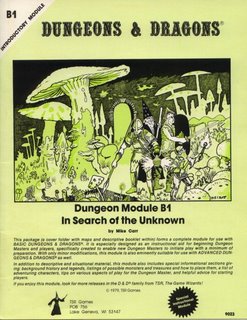Since the late 1980s, trends in adventure writing have turned away from the theme of pure exploration. I miss this, part out of nostalgia but also out of the lack of open-ended, exploration-style plots.
The first module I ever ran was Mike Carr’s venerable
In Search of the Unknown, an adventure that came with the D&D Basic Set (mine was the “blue box” set and also the Fifth Edition, I believe). I still clearly remember my friend Brian and I hunched over the books in my cluttered room, sometime in 1979, trying to play for the first time. I ran a fighter, Brian a magic-user. We paged through the mysterious, monochrome blue book with the attacking red dragon on the cover and had little idea what we were doing. It didn’t matter; we had fallen down that long, deep rabbit hole and were there to stay, loving every minute (and now, as I’ve just entered my forties, I apparently still haven’t climbed out yet).

The module required the DM to fill in monsters from a roster, and we were a bit weak on the whole DM concept as it was, so we simply moved around the map, reading room descriptions as we went and rolling on the Wandering Monster chart for random inhabitants. My first fight was … a mighty giant ant.
One giant ant, to be precise. (At the time I pictured a beastie right out of the B-movie
THEM! so this was fearsome enough…)
To the best of my knowledge Carr never wrote another module (although he did stay active for a time writing
Endless Quest books and similar projects) but
Search was a great work at that time and still serves as an excellent example of a dungeon lair. The ancient den of Roghan and Zelligar contained all the requisite elements: secret doors, basic traps and misdirecting areas, necessary rooms, weird places to be explored (some of which include amusing bits of humor), and a lower level different in feel from the first.
The one thing
Search lacked was a reason for the PCs to be in the dungeon. If memory serves (and admittedly it often serves like an under-tipped waiter these days), there's no real PC motivation beyond the "heard about the mysterous ruin and decided to explore it" reason. Granted, this is both an introductory-level adventure and a DM fill-in special, so presumably a DM might add a PC motivation to match with his or her unique stocking of the dungeon (as mentioned earlier, the dungeon comes basically unstocked in the monster dept.). It's my suspicion however that the lure of an infamous lair was meant to be the primary motivation. The goal is outlined in the module's very title.
Later modules also followed the “light-background–heavy-exploration” model, at least for a while. Gary Gygax’s much-beloved, genre-twisting
Expedition to the Barrier Peaks had a nominal mission—find out where the weird creatures are coming from—but really it was an exploration module, plain and simple. That was really the fun of it, entering the ominous metal door and stepping into an unknown world filled with malfunctioning androids, mutants, turbolifts, killer plants, and futuristic weapons. Players didn’t know what to expect—nearly anything could be around any corner and that was half the fun.

I guess that’s my real point. There didn’t need to be a planet saving mission, or an evil ring to destroy, or the like—players were quite content to roam were they may, finding treasure and fighting monsters, and hoping they would simply get out alive.
Eventually module writing matured, and players began to look for important missions or dungeons that keyed into a whole campaign, thus enriching the whole. It wasn’t a bad development really, and it led the way for DMs to tie adventures together into a near-seamless tapestry of adventure plots. Accomplishment was emphasized, randomness (and random player action) was reduced, and campaigns became more cohesive. Like any good game, D&D was changing with the times.
After a time the pendulum begins to swing back the other way, of course. Players get jaded and begin to recognize the standard plots and MacGuffins for what they are. DMs feel the unwanted, obligatory pull to insert a mission or purpose to get the PCs to where he or she really wants them—the dungeon.
Bad missions become the equivalent of the tavern meeting: a forced, unwanted plot device. Good missions are omnipresent directives that remind the party
what they are seeking or doing, but often the players mentally discard the mission much of the time to focus on the real fun at hand, which is fine, so long as the mission isn’t completely forgotten. If done well, a good adventuring purpose becomes a part of the background, something to keep in mind while doing other things and something that floats to the fore at important times—when the party must solve a puzzle or make an important decision, for instance.
I miss the pure exploration modules, but really they haven’t disappeared. All the stalwarts are there—lost pyramids, weird islands, unknown towers, crumbling castles, and the PCs need only arrive at their destination (motivated or not). A bit of background reduction/modification is often all that’s needed to bring back the good old days. All one really needs is atmosphere and a good adventure that evokes a sense of wonder.


